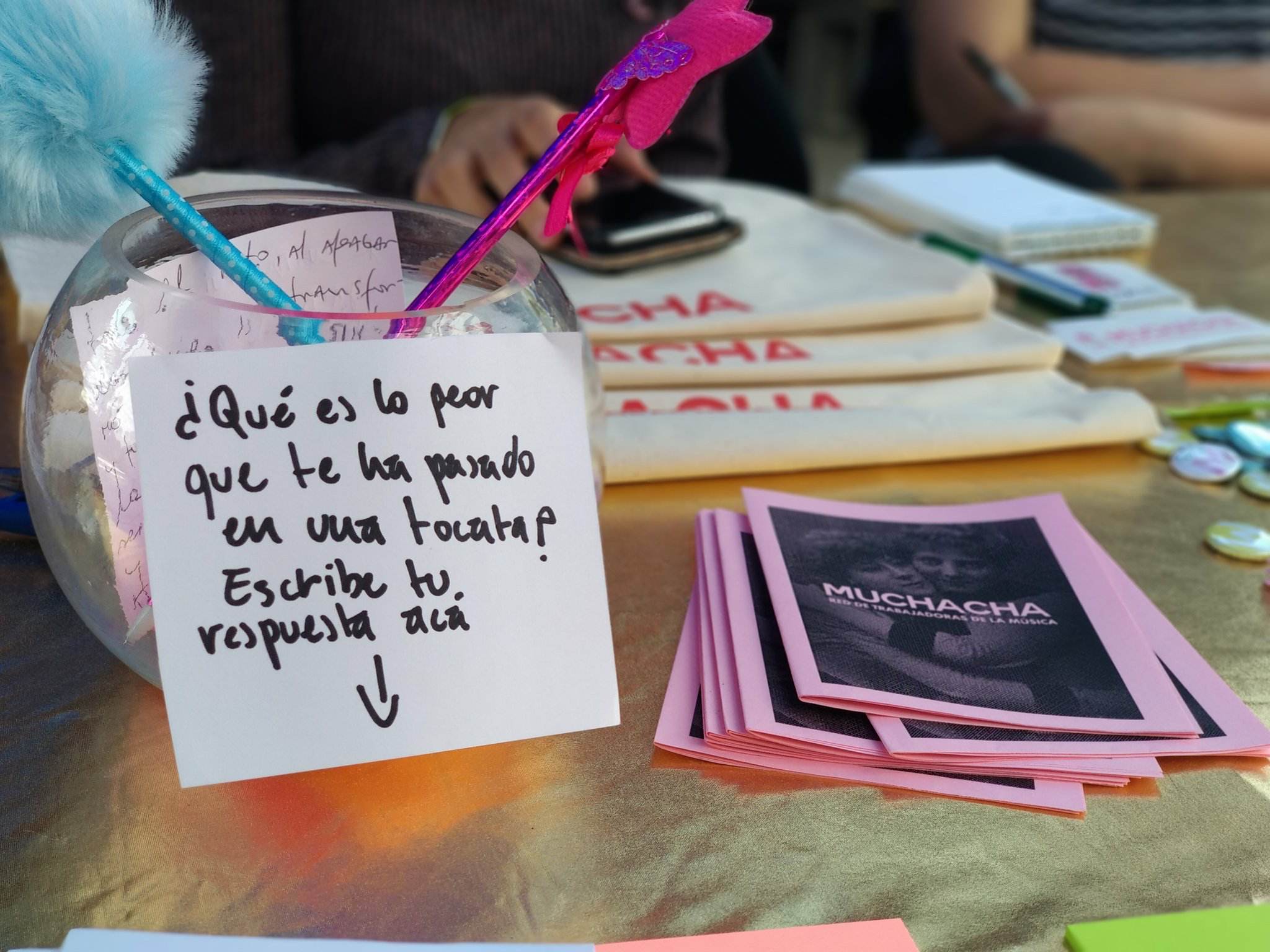Last year, Chilean journalist Javiera Tapia Flores opened the doors to a friend’s house in Santiago and invited about 20 women from the music scene over with a simple request: “Tell me about your experiences as a woman in the industry.”
For hours, she listened to story after story of the abuses women had endured. According to Tapia Flores, the music scene in Chile is small, yet vastly male-dominated. Some of the incidents she heard about involved direct violence at the hands of male musicians, but the anecdotes also ran the gamut of misconduct and misbehavior. Several women described being badgered at concerts; others talked about being completely overlooked for professional opportunities. The discussions went from 6pm to 2am, and they built the foundation for a series of five articles on gender violence and discrimination that Tapia Flores eventually wrote for the website POTQ.
But simply publishing the stories wasn’t enough. The dialogue had reinforced that women from the scene wanted a space to continue exchanging knowledge and fostering professional relationships. So, they came up with an idea: They decided to create Muchacha, a digital network and community that unites women working in the Chilean music industry. The group put out a call over social media and watched as responses flooded in.
“There was an immediate reaction,” Tapia Flores remembered. “It was overwhelming in the beginning. The first days, our mailbox was full of messages from women saying, ‘Here’s my contact and please let me know what we can do together.’ For me, that was the best proof that we needed to connect.”

These days, the network boasts nearly 360 members, all women who work in different sectors of the Chilean music industry. The group includes musicians, sound engineers, concert photographers, producers, writers, PR mavens, promoters, and pretty much any other job one can think of in music. The central imperative of the network is to uplift women professionally and have them get to know one another for future projects—a social alliance and system of solidarity meant to boost careers.
For Tapia Flores, this kind of visibility among women is critical. She’s a longtime journalist who has been covering the Chilean music scene for music magazines and blogs over the last decade. When she first got her start, she recalls pitching stories that interrogated the intersection of music and gender—and constantly hearing that those kinds of articles weren’t interesting. So, she began writing on her own, eventually co-authoring a book on Chilean music called Es difícil hacer cosas fáciles: Los diez años que cambiaron la música en Chile.
As the cultural zeitgeist has drawn a spotlight onto the harrowing effects of sexism and misconduct amid the MeToo movement, Tapia Flores has become intent on reopening questions of gender discrimination that have always captured her interest. The conversation, she said, is still evolving in Chile, but she has been doing her part to make sure it continues to unfold. “Women are leading these discussions, but it’s not a general conversation yet and men working in the industry aren’t even participating,” she explained. “So it’s been hard because obviously it’s something that affects all of us.”
When she started asking women for their stories last year, one of the people she reached out to was Karla Sanchez Layera, a journalist and concert photographer who shared her own story of being harassed at a live show. Seeing how many other women had been through similar abuse struck a profound chord in Sanchez Layera, and she instantly jumped to make Muchacha a reality.
“When you go to see a band, you just want to enjoy it, and I thought I was the only one that this had happened to. But the night we all met, there were a lot of girls who said, ‘I was in this concert and this guy started harassing me,’ and when I read Javiera’s articles, I was like, ‘I’m not alone in this,” she said. “That’s why I was so excited when I heard about [Muchacha]. As women, we need to coordinate and have this kind of organization between us.”
Now, the network is focusing on several main initiatives. The members want to create an inclusive directory that continues to link professionals. Sanchez Layera explains, “We want the women that came to us to be able to say, ‘I have this band, and I’ve had bad experiences and don’t want men to take my pictures, I want a woman.’ This is a chance to create our own systems and chances for other women.”
Muchacha is also planning to reach out to like-minded organizations and NGOs to see how they can continue raising awareness of discrimination and harassment. Tapia Flores says she hopes to partner with places like Brava in the south of Chile, Santiago’s Femfest and Ruidosa, Udara in Valparaiso, and many others. Another major ambition of hers is to create links across Latin America and get women talking across borders.
“Chile is like an island—it’s expensive for people to travel and we’re at the bottom of the world, so it’s a little complicated, but we think it’s so important to get to know the reality of other women in Latin America,” she said. “We can build the same thing and make it easier for artists and women in the industry to work—and to feel safe as well.”







